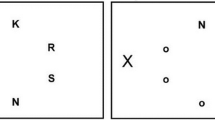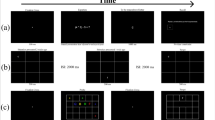Summary
The premise that cognitive functioning can be influenced through dietary means has gained widespread interest. The assessment of cognitive functioning is a key method to scientifically substantiate such nutritional effects on cognition. The current paper provides a basic overview of the main concepts, issues and pitfalls of human cognitive research. General methods of cognitive assessment, selection of appropriate tests, factors that may mediate task performance and issues pertaining to the interpretation of the results are discussed.
Similar content being viewed by others
References
Westenhoefer J, Bellisle F, Blundell JE, de Vries J, Edwards D, Kallus W, Milon H, Pannemans D, Tuijtelaars S, Tuorila H (2004) PASSCLAIM—Mental state and performance. Eur J Nutr 43:II/85–II117
Sanders AF (1998) Energetics, Stress and Sustained Attention. In: Sanders AF (ed) Elements of Human Performance. Lawrence Erlbaum Associates, New Jersey, pp 394–451
Yerkes RM, Dodson JD (1908) The relation of strength of stimuli to rapidity of habituation. J Comp Neurol Psychol 18:459–482
Watters PA, Martin F, Schreter Z (1997) Caffeine and cognitive performance: the nonlinear Yerkes-Dodson Law. Hum Psychofarmacol 12:249–257
Blaney PH (1986) Affect and memory: a review. Psychol Bull 99:229–246
Revelle W (1986) Motivation and efficiency of cognitive performance. In: Brown DR, Veroff J (eds) Frontiers of Motivational Psychology: Essays in honor of J. W. Atkinson. Springer, pp 105–131
Lezak MD, Howieson DB, Loring DW (2004) Neuropsychological assessment. Oxford University Press, New York
Hughes D, Bryan J (2003) The assessment of cognitive performance in children: considerations for detecting nutritional influences. Nutr Rev 61:413–422
Sternberg S (1969) Memory scanning: mental processes revealed by reaction time experiments. Am Sci 57:421–457
Poldrack RA, Wagner AD (2004) What can neuroimaging tell us about the mind? Insights from prefrontal cortex. Curr Dir Psychol Sci 13:177–181
Wilkinson D, Halligan P (2004) The relevance of behavioural measures for functional-imaging studies of cognition. Nat Rev Neurosci 5:67–73
Bub DN (2000) Methodological issues confronting PET and fMRI studies of cognitive functions. Cogn Neuropsychol 17:467–484
Kosik KS (2003) Beyond phrenology, at last. Nat Rev Neurosci 4:234–239
Curran S (1990) Critical Flicker Fusion techniques in psychopharmacology. In: Hindmarch I, Stonier PD (eds) Human Psychopharmacology. John Wiley, Chichester, pp 21–38
Warm JS (1984) An introduction to vigilance. In: Warm JS (ed) Sustained Attention in Human Performance. John Wiley and Sons, pp 1–13
Schaie KW (1994) The course of adult intellectual development. Am Psychol 49:304–313
Liben LS, Susman EJ, Finkelstein JW, Chinchilli VM, Kunselman S, Schwab J, Dubas JS, Demers LM, Lookingbill G, Darcangelo MR, Krogh HR, Kulin HE (2002) The effects of sex steroids on spatial performance: a review and an experimental clinical investigation. Dev Psychol 38:236–253
Houx PJ, Vreeling FW, Jolles J (1991) Age-associated cognitive decline is related to biological life events. In: Iqbal K, McLachlan DRC, Winblad B, Wisniewski HM (eds) Alzheimer’s Disease: Basic Mechanisms, Diagnosis and Therapeutic Strategies. John Wiley and Sons Ltd, Chichester, UK, pp 353–359
Monk TH, Buysse DJ, Reynolds CF, 3rd, Berga SL, Jarrett DB, Begley AE, Kupfer DJ (1997) Circadian rhythms in human performance and mood under constant conditions. J Sleep Res 6:9–18
Wilson BA, Watson PC, Baddeley AD, Emslie H, Evans JJ (2000) Improvement or simply practice? The effects of twenty repeated assessments on people with and without brain injury. J Int Neuropsychol Soc 6:469–479
Adams JA (1961) The second facet of forgetting: A review of warm-up decrement. Psychol Bull 58:257–273
Hockey GRJ (1997) Compensatory control in the regulation of human performance under stress and high workload: a cognitive energetical framework. Biol Psychol 45:73–93
Sanders AF (1998) Elements of Human Performance. Lawrence Erlbaum Associates, New Jersey
Dye L, Blundell JE (2002) Functional foods: psychological and behavioural functions. Br J Nutr 88:S187–S211
Schmuckler MA (2001) What is ecological validity? A dimensional analysis. Infancy 2:419–436
Kibby MY, Schmitter-Edgecombe M, Long CJ (1998) Ecological validity of neuropsychological tests: focus on the California Verbal Learning Test and the Wisconsin Card Sorting Test. Arch Clin Neuropsychol 13:523–534
Chaytor N, Schmitter-Edgecombe M (2003) The ecological validity of neuropsychological tests: a review of the literature on everyday cognitive skills. Neuropsychol Rev 13:181–197
Ramaekers JG (2003) Antidepressants and driving impairment: empirical evidence from a standard over de road test. J Clin Psychiatry 64:20–29
Rose SPR (2002) Smart drugs: do they work? Are they ethical? Will they be legal? Nat Rev Neurosci 3:975–979
Author information
Authors and Affiliations
Corresponding author
Rights and permissions
About this article
Cite this article
Schmitt, J.A.J., Benton, D. & Kallus, K.W. General methodological considerations for the assessment of nutritional influences on human cognitive functions. Eur J Nutr 44, 459–464 (2005). https://doi.org/10.1007/s00394-005-0585-4
Received:
Accepted:
Issue Date:
DOI: https://doi.org/10.1007/s00394-005-0585-4




